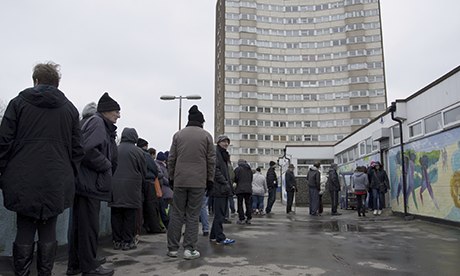Seventy years ago a landmark report highlighted the shocking scale of social deprivation. With the welfare state under attack, we now need another one

The Storehouse food bank in Southend.
Photograph: John Domokos
In 1943, during the second world war, the Women's Group on Public Welfare published Our Towns: A Close-Up. Written by eight women who were all active in health visiting, teaching or voluntary bodies, it was set to influence social reform. The original aim was to examine the enormous number of complaints made about working-class evacuees sent from areas likely to be bombed, to safer, often more prosperous places. Many children were accused of being verminous, enuretic, lacking clothing, and badly behaved. Mothers who accompanied younger children were said to be "given to drinking and frequenting public houses, and loose in their morals".
An evacuee myself, I recall lining up with my sister to have our hair examined before being selected by a host. My mum missed us so much she later joined us. Yes, she did go the pub, she did chat with PoWs working in the fields, but she was a great mum.
The writers decided to study the areas from which the children came. They stated: "Evacuation became a window through which English town life was suddenly and vividly seen from a new angle." They found that massive overcrowding, shared toilets and no hot water were common. No wonder many had lice, dirty faces and ill-health. Up to 30% of children were below the poverty line so that a typical mother "simply did not have enough money to pay for the bare essentials of rent, food, clothing, fires, light and cleaning materials".
The authors argued that the extensive social deprivation was not down to inadequate parents but poverty. They made radical proposals for nursery schools, better housing, a minimum wage, children's allowances, price control of basic commodities, and a national medical service. They added: "Trade and industry must take their place as servants not masters of the community, recognising a duty not only economic but moral."
They recognised the positives: most poor parents did care about their children, they insisted: "The majority of the working class have both character and intelligence, and the manner in which they faced the hard days of unemployment was heroic." But they required a better environment to flourish.
The book was a sell-out and twice reprinted. It received wide press coverage and helped secure middle-class support for better welfare services later brought about by the postwar Labour government.
Today, 70 years later, the welfare state is being destroyed by the coalition government. In the east end of Glasgow where I live and work, I meet people in dire material need. One woman was forced to stop work by severe angina. During the tests introduced by the Department of Work and Pensions, she missed a medical appointment and was fined a week's benefits. Unable to pay her gas bill, she took a £50 loan from a high-street shark and had to pay back £75. She has no savings and cannot afford shoes and clothes.
Easterhouse Baptist Church has started a cafe one day a week. Tea and coffee is free, as is fruit for children, and hot snacks are cheap. A widow with three children stays the whole time, because the cafe is warm. A middle-aged man paying the wretched bedroom tax comes in once a fortnight. He cannot afford even the cheap snacks on a weekly basis. Recently, a man walked into the church not having eaten for three days. We shared our sandwiches.
It's time for another Our Towns, and I nominate these eight women to write it: Josephine Feaney, children's writer and carer for a young woman with severe learning difficulties; Loretta Gaffney of the Easterhouse Citizens Advice; Audrey Flannagan, who runs a food bank; TUC leader Francis O'Grady; Karen Postle, a social worker who focuses on the poor; Jo Tunnard, who specialises in preventing poor children going into care; Tricia Zippel, a long-serving community worker; and Sally Young of the Newcastle Council for Voluntary Service.
As well as visiting areas of social deprivation, they should go to places where the richest dwell. Now, just as it was 70 years ago, some live in poverty because others live in luxury.
Bob Holman - Guardian